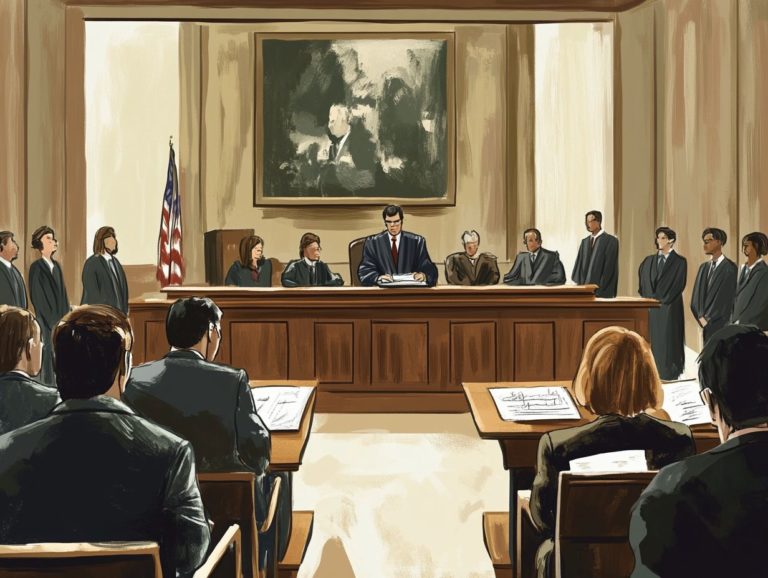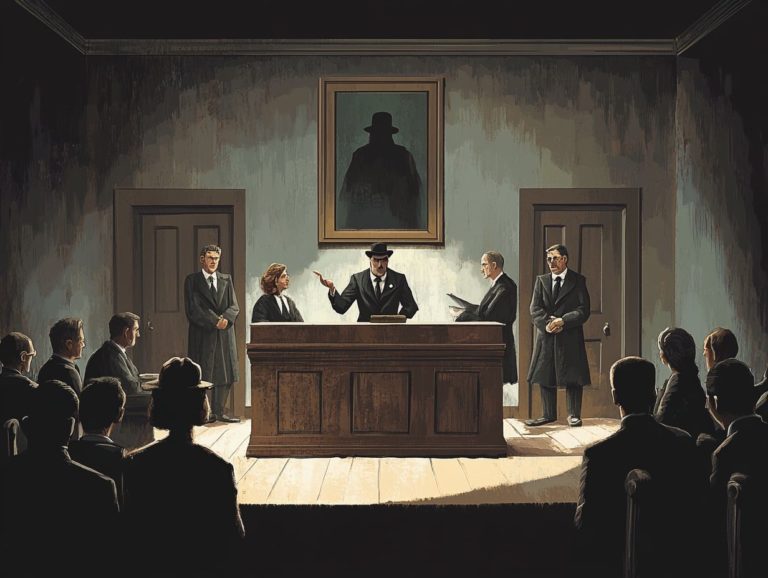The Importance of Client Communication in Defense
Effective communication is the backbone of successful defense work.
In a realm where clarity and trust are vital, understanding verbal and nonverbal interactions makes all the difference.
This article explores the critical role communication plays in the legal world. It emphasizes essential skills that foster strong client relationships.
From navigating challenges presented by difficult clients to harnessing technology for improved dialogue, you ll find strategies designed to elevate your practice and ensure that clients feel both heard and valued.
Contents
- Key Takeaways:
- The Role of Communication in Defense
- Types of Communication in the Legal Field
- Key Skills for Effective Client Communication
- Common Challenges in Client Communication
- Strategies for Improving Client Communication
- Frequently Asked Questions
- What is the importance of client communication in defense?
- How does client communication affect the outcome of a defense case?
- What are some key aspects of effective client communication in defense?
- How can client communication help in managing client expectations?
- What are some common challenges in client communication in defense?
- How can client communication in defense be improved?
Key Takeaways:

- Effective communication is crucial in defense as it helps establish trust, manage expectations, and ensure a successful outcome for clients.
- The key skills for effective client communication include active listening, empathy, and transparency.
- Strategies for improving client communication include establishing open channels, providing regular updates and feedback, and utilizing technology for more efficient communication.
The Role of Communication in Defense
Effective communication stands as a cornerstone in the defense sector. It is especially important for lawyers striving to cultivate strong client relationships and navigate the intricacies of legal processes.
Your success in building an attorney-client relationship is rooted in trust. It s vital to convey emotions clearly to minimize misunderstandings.
It s essential to adopt a proactive approach when engaging with clients. Recognizing emotional needs and expectations in high-stress situations is crucial.
By establishing clear expectations from the outset, you lay the groundwork for a constructive and trusting relationship.
Why Effective Communication is Crucial
Effective communication is essential in the legal field, as it prevents misunderstandings and fosters strong engagement with clients.
When you explain your thoughts clearly, you help clients grasp complex legal concepts, sidestepping potential confusion. For instance, when you take the time to thoroughly explain the steps in a legal process or the implications of a contract, you clarify expectations and build accountability.
Incorporating feedback mechanisms like regular check-ins and maintaining open channels for questions can significantly strengthen your relationship with clients.
Clear legal advice ensures clients feel informed and enabled, paving the way for a smoother, more successful legal journey together!
Types of Communication in the Legal Field
In the legal field, you can categorize communication into verbal, nonverbal, and written forms. Each plays a crucial role in conveying intricate legal terminology.
This ensures that your interpersonal skills are effectively leveraged across various communication channels.
Verbal and Nonverbal Communication
Verbal communication involves not just the spoken word but also the nuances of dialogue. Nonverbal communication encompassing body language and facial expressions plays a pivotal role in shaping the attorney-client relationship.
In the realm of law, these forms of communication are vital to ensuring clear understanding. For instance, when an attorney explains complex legal terminology effectively, it enhances a client s grasp of their case.
Employing attentive body language, like an open posture and consistent eye contact, builds trust and encourages clients to share sensitive information freely. Honing effective listening skills further enhances this relationship.
An attorney who actively listens can discern subtle cues in a client s demeanor or speech that reveal underlying concerns. This ultimately leads to a more informed and responsive legal strategy.
Written Communication
Written communication holds immense importance in legal practices, ensuring that legal terminology is clear. It provides a documented record that facilitates feedback and effective consultation.
In the legal arena, where precision is essential, your ability to craft documents such as contracts, briefs, and pleadings with meticulous attention to detail can significantly influence outcomes.
Emails and formal letters are essential tools for conveying your intentions and positions, often laying the groundwork for negotiations and agreements.
Given the intricate nature of laws and regulations, it s vital for you to express your messages clearly to prevent misunderstandings and disputes.
This clarity helps establish trust between parties and streamlines the resolution process, ultimately promoting effective communication in what can often be a convoluted environment.
Key Skills for Effective Client Communication

Essential skills for effective client communication encompass active listening, empathy, and a profound understanding of their needs.
Coupled with transparency in sharing information, these elements work together to cultivate strong, trust-based relationships between attorneys and their clients.
Active Listening
Active listening is a crucial communication skill that enables you to fully grasp your clients’ needs and emotional concerns. This paves the way for insightful feedback and tailored legal strategies.
By embracing this practice, you can cultivate deeper connections, ensuring that your clients feel heard and valued.
Try maintaining eye contact, nodding, and summarizing key points to make your interactions more effective.
Setting aside distractions during consultations fosters a more focused dialogue. This allows for improved comprehension and creates an atmosphere of trust and respect.
When clients see their concerns acknowledged, they are more likely to open up, leading to a comprehensive understanding of their situations and ultimately strengthening the bond between you and your clients.
Empathy and Understanding
Empathy and understanding are essential in legal communication, enabling you to build trust with your clients while effectively acknowledging and addressing their emotions and concerns.
When clients feel genuinely heard and validated, they are far more inclined to engage openly with you, sharing crucial information that could significantly influence case outcomes.
For example, a personal injury lawyer who listens to a client’s story creates a supportive atmosphere. This reassures clients and helps tailor legal strategies to their needs.
Consider a case study involving a family law dispute, where attorneys who practiced empathetic communication were able to resolve matters more amicably. The result? Happier clients and smoother proceedings, showcasing the profound impact of empathy in your legal practice.
Transparency and Clarity
Transparency and clarity in communication are vital for delivering legal advice that aligns with your expectations, ultimately enhancing your satisfaction throughout the legal process.
When legal professionals engage in open dialogue and provide thorough explanations of each step involved, you gain a deeper understanding and feel more enabled. This two-way communication can demystify complex legal concepts, making them easier to grasp and relate to.
By setting realistic timelines and outlining potential outcomes, your legal practitioners can effectively manage expectations and alleviate any anxiety you may have.
Actively seeking your feedback ensures you feel heard and valued, fostering a sense of trust.
A commitment to clear and transparent communication strengthens the relationship between you and your attorney. It also creates a collaborative environment where informed decisions can thrive.
Common Challenges in Client Communication
Navigating client communication can present several common challenges, such as communication barriers, managing difficult clients, and setting realistic expectations.
Each of these factors can impede the effective delivery of legal advice and diminish accountability. Address these challenges now to ensure you provide the best legal service!
Dealing with Difficult Clients
Dealing with difficult clients often means uncovering underlying issues. Effective communication helps break down barriers and rebuild trust.
Listen actively to their concerns. This creates a constructive dialogue and builds a better relationship.
Utilizing open-ended questions encourages clients to express their viewpoints more freely. This proactive engagement enhances your rapport with them, allowing clients to feel heard and paving the way for resolutions.
Managing Expectations

Managing expectations is crucial in client communication. Clearly explain what you need while providing timely feedback throughout the legal process.
To ensure success, keep in touch regularly. Schedule updates and check-ins where progress is clearly outlined, offering peace of mind.
Implementing ways to check how clients feel about the service such as surveys or informal conversations allows you to address concerns promptly.
Actively listening and adjusting your approach based on client feedback fosters a stronger partnership, leading to heightened trust and a more positive experience.
Strategies for Improving Client Communication
Implementing strategies to enhance client communication creates open channels that foster transparency.
Regular updates become second nature, ensuring clients are always informed.
Using technology can greatly improve accountability, creating a seamless experience for all parties involved.
Establishing Open Communication Channels
Establecer canales de comunicaci n abiertos es crucial para mejorar el compromiso con tus clientes. Aseg rate de que sigas siendo accesible como abogado.
Para lograr esto, considera emplear varios m todos. Env a actualizaciones regulares por correo electr nico, proporciona portales dedicados para que los clientes accedan f cilmente a los archivos del caso y programa llamadas de seguimiento para discutir el progreso.
Al implementar estas estrategias, puedes cultivar una relaci n basada en la confianza. Utilizar mensajes de texto o aplicaciones de mensajer a instant nea te permite ofrecer respuestas inmediatas a las preguntas de tus clientes.
Involucrar a los clientes de esta manera muestra tu compromiso y los empodera, haci ndolos sentir m s involucrados e informados sobre sus casos.
Regular Updates and Feedback
Providing regular updates and actively seeking feedback from clients enhances satisfaction. This highlights the importance of effective communication in legal advice.
When clients feel informed about their cases, they re more likely to trust their advisors. This transforms a stressful experience into a collaborative partnership.
This ongoing dialogue creates a feedback loop, enabling the advisor to make necessary adjustments and align strategies with client expectations.
Keeping clients informed reassures them that their interests are prioritized and establishes a foundation of transparency. This nurtures a positive relationship and leads to higher satisfaction levels.
Start improving your client communication today for a smoother legal journey!
Using Technology for Communication
Using technology for communication in your legal practice not only addresses your clients’ needs but also reinforces accountability. This enables a more proactive approach to managing vital relationships.
By using tools like secure messaging platforms, video conferencing software, and client management systems, you create a dynamic environment where information flows quickly and efficiently.
As clients increasingly seek transparency regarding their legal matters, these technological advancements allow you to provide crucial updates and facilitate immediate responses.
Using collaborative platforms tools that help teams work together ensures everyone stays in sync throughout the legal process. This enhances trust and satisfaction.
Embrace these innovations to improve operational efficiencies while strengthening your connections with clients. Ultimately, this fosters long-lasting relationships.
Frequently Asked Questions
What is the importance of client communication in defense?

Client communication is crucial in defense because it builds a strong partnership between the client and the defense team. It ensures that the client’s needs and expectations are met while fostering trust and understanding.
How does client communication affect the outcome of a defense case?
Effective client communication can significantly impact the outcome of a defense case. It helps the defense team understand the client’s perspective, ultimately leading to a stronger defense strategy and a more compelling case in court.
What are some key aspects of effective client communication in defense?
Effective client communication includes open talks, active listening, and timely updates. Providing all necessary information helps clients make informed choices.
How can client communication help in managing client expectations?
Regular and transparent communication helps manage client expectations throughout the defense process. By setting realistic expectations and providing updates on the case’s progress, clients better understand what to expect and can avoid potential misunderstandings.
What are some common challenges in client communication in defense?
Common challenges in client communication include language barriers, conflicting schedules, and different communication preferences. The defense team must identify these challenges and find ways to overcome them for effective communication.
How can client communication in defense be improved?
Clear and consistent communication, setting expectations from the beginning, and using technology such as email, video conferencing, or text messages can enhance client communication in defense. Actively listening to the client’s concerns and addressing them timely is also essential.






